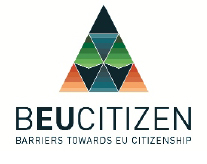Barriers to the exercise of EU citizenship rights. Factual and legal analysis
The bEUcitizen project focuses on the barriers to realise and exercise EU citizenship rights, from different perspectives: social, political, legal, linguistic, economical, etc. Some of the work packages (five and seven) specifically deal with legal issues, and investigate how and to what extent the enjoyment of economic and civil rights of EU citizens is effective or rather hampered by specific obstacles.
The research carried out so far has shown a variety of barriers to EU citizenship in different fields of the law. Despite the shift of the EU Commission towards maximum harmonisation, fragmentation and lack of coordination are still likely to characterise the relations among European, national and regional regulations on many issues affecting EU citizens’ rights, as well as the praxis related to the concrete application and enforcement of the related provisions.
An in depth analysis of the different levels (EU primary and secondary law, national law, regional rules, etc.) and of the different nature (legal, factual, economical, administrative, pathological – e.g. bad quality of legislation, lack of coordination among the different institutions and bodies involved – etc.) of the plurality of barriers that still exist to realise and exercise EU citizenship rights is thus needed.
The Trento seminar therefore aims at stimulating an interdisciplinary and comparative dialogue among experts – especially young scholars – and participants’ critical thinking skills and ideas on the bEUcitizen key concept of “barrier” and on different kinds of hindrances, with the purpose of a scientific and critical categorisation of them.
In this context, for instance, the classification of the barriers as “factual” or “legal” may be crucial in distinguishing different types of obstacle, their origin and concrete impact on citizens’ rights. Some barriers might indeed directly derive from legal rules (e.g. different regulations between EU Member States), while others barriers, although often regulated by the law, emerge from factual situations (e.g. the coexistence of two or more different linguistic groups). In the latter case the function performed by the law is simply that of regulating a factual situation that is at the origin of a hindrance to some rights, whereas in the former case legal rules themselves create a barrier to the exercise of a given right.
To properly deal with all these issues, the seminar is organised into three sessions: a number of lectures given by invited key note speakers – among them, the bEUcitizen coordinator prof. Sybe de Vries; and two round table focusing on two opposite, but to some extent interrelated, perspectives: “from legal towards factual barriers” and “from factual towards legal barriers”.
Programme
14. 30 Welcome address
Prof. Giuseppe Nesi, Professor of International and European Law, Dean of Trento Faculty of Law
14. 40 Project presentation
Prof. Elena Ioriatti, Trento University, bEUcitizen project from the Unitn perspective
- Chair prof. Elena Ioriatti
15.00 Key note speaker
Prof. Sybe de Vries, bEUcitizen project coordinator, Utrecht University
15. 30 First Round Table
From legal towards factual barriers to the exercise of EU citizenship’s rights
Dr. Flavio Guella, Trento University.
Dr. Paolo Guarda, Trento University.
Dr. Teresa Solis Santos, Antwerp University.
16. 30 Coffee break
- Chair prof. Sybe de Vries
17.00 Key note speaker
Prof. Martin Seeleib-Kaiser, Oxford University
17.30 Second Round Table
From factual towards legal barriers to the exercise of EU citizenship’s rights
Dr. Silvia Adamo, Copenhagen University
Dr. Maribel Gonzalez Pascual, Pompeu Fabra University Barcellona
Dr. Elisabetta Pulice, Trento University
18.30 Conclusions
Prof. Luisa Antoniolli, Trento University





